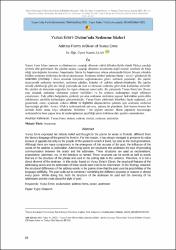Yunus Emre Divanı’nda seslenme sözleri
Künye
Alan, N. (2021). Yunus Emre Divanı’nda Seslenme Sözleri . Afyon Kocatepe Üniversitesi Sosyal Bilimler Dergisi , Yunus Emre ve Türkçe Özel Sayısı , 83-111 . DOI: 10.32709/akusosbil.976587Özet
Yunus Emre İslam inancını ve düşüncesini yaşadığı dönemin edebî dilinden farklı olarak Türkçe yazdığı şiirlerle dile getirmiştir. Bu yüzden sadece yaşadığı dönemin insanlarına değil sonraki nesillere de hitap ettiği için değerini korumayı başarmıştır. Şairin bu başarısının ortaya çıkmasında birçok bileşen olmakla birlikte seslenme sözlerinin de etkisi yadsınamaz. Seslenme sözleri seslenen (hatip / verici / gönderici) ile seslenilen (muhatap / alıcı) arasında iletişimin sağlanmasında görev üstlenen yapılardır. Bu yapılar alanyazında seslenme ünlemleri, seslenme edatları, hitaplar vb. şekilde adlandırılmaktadır. Bu yapılar sözcük olabileceği gibi söz öbeği yapısında da olan ve tümcede seslenme görevinde kullanılan sözlerdir. Bu yüzden de tümcenin doğrudan bir ögesi olmayan unsurlardır. Bu çalışmada Yunus Emre’nin Divanı esas alınarak seslenme sözlerinin yapısal özellikleri ve bu sözlerin muhatapları tespit edilmeye çalışılmıştır. Elde edilen bulgularda, şiirlerde yer alan seslenme sözlerinin yapısal farklılıkları şairin dilin imkânlarını ustalıkla kullandığını göstermektedir. Yunus Emre şiirlerinde insanlara fayda sağlamak, yol göstermek, onları uyarmak, onların dikkat ve ilgilerini düşüncelerine çekmek için seslenme sözlerine başvurduğu görülür. Ayrıca Allah’a seslenmelerde yalvarış, yakarış ön plandadır. Şair hemen hemen her şiirinde farklı amaç veya sebeplerle, birilerine / bir şeylere seslenir. Bunu yaparken başvurduğu seslenmelerin hem yapısı hem de muhataplarının çeşitliliği şairin üslubuna dair ipuçları sunmaktadır. Yunus Emre expressed her Islamic belief and thought in the poems he wrote in Turkish, different from the literary language of the period he lived in. For this reason, it has always managed to preserve its value because it appeals not only to the people of the period in which it lived, but also to the next generations. Although there are many components in the emergence of this success of the poet, the influence of the words of the address is undeniable. Addressing words are structures that undertake the task of providing communication between the orator and the addressee. These structures are used as exclamations, prepositions, addresses, etc. in the literature so named. These structures can be words as well as words that are in the structure of the phrase and used in the calling task in the sentence. Therefore, it is not a direct element of the sentence. In this study, based on Yunus Emre's Divan, the structural features of the addressing words and the addressees of these words were tried to be determined. In the findings obtained, the structural differences of the address words in the poems show that the poet uses the possibilities of the language skillfully. The poet calls out to someone / something for different purposes or reasons in almost every poem. While doing this, both the structure of the addresses he used and the diversity of his addressees provide clues about the style of poet.
Kaynak
Afyon Kocatepe Üniversitesi Sosyal Bilimler DergisiCilt
23Sayı
Yunus Emre ve Türkçe Özel SayısıBağlantı
https://dergipark.org.tr/tr/pub/akusosbil/issue/65941/976587https://hdl.handle.net/11630/10569



















